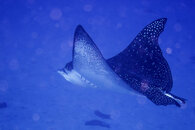"Some stupid tiger shark culling" ... nice to see that you advocate wiping out marine life so you can dive without being bothered to look over your shoulder. Any other offending creatures you wish removed? Would you like us to repeal oceanography or physics so you don't have to worry about strong currents, the bends, oxygen toxicity, etc?
Scuba diving is entering a wilderness environment, and we are but visitors. Apex predators are as much a part of that environment as the water itself. The only way to counter them is to stay alert to your surroundings and have options for getting yourself out of that situation - just as you would for any other diving emergency.
A woman died in this incident, and that is a tragedy. So are the other deaths due to perils of the ocean reported in this forum. We mourn, we learn, we adapt, and we keep diving. We do not demand that the ocean be made perfectly safe for us by altering its very nature.




